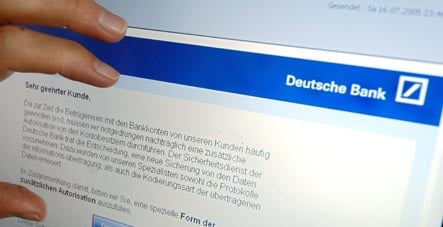Internet criminals are profiting from the financial crisis, hitting up bank customers running scared over plummeting share values and currency fluctuations, according to a report in the Saturday edition of Munich daily Süddeutsche Zeitung.
German internet security firm G-Data told the paper that tricksters have been sending out an increased number of phishing and spam messages in recent weeks, trying to con individuals into revealing their private banking information.
According to G-Data, the number of such mails has been on the rise, and the subject lines have grown increasingly alarmist.
“Beginning tomorrow, €100 will only be worth €9.33” was one subject, while others ask whether shares in Deutsche Bank or Allianz insurance company will be worth anything by the next day.
An unsuspecting individual watching the plummeting share market could be inclined to subscribe to a newsletter for an answer – but a newsletter that requires the revelation of private data, Ralf Benzmüller of G-Data said.
He said the company, which manufactures anti-virus and anti-spam software, had been catching a steadily rising number of such e-mails in their spam filters.
Federal officials have also been warning of racketeers, who lure individuals to seemingly legitimate websites before getting them to reveal their account numbers, passwords and other personal information.
Officials said consumers should never respond to such queries, report them to authorities and keep their virus software up to date. A bank, for instance, would contact them through official channels such as by letter and not via e-mail.



 Please whitelist us to continue reading.
Please whitelist us to continue reading.